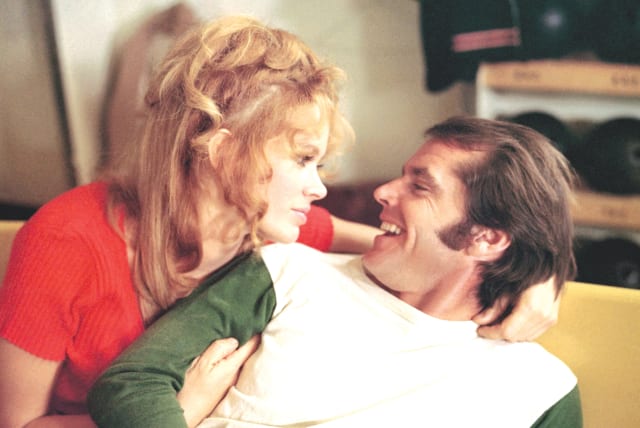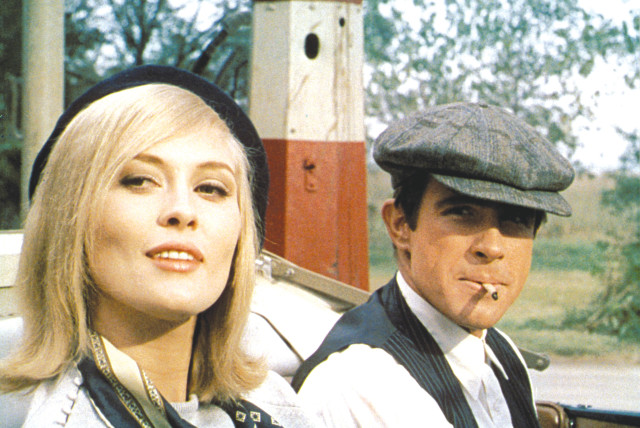New Israeli film program celebrates the 70's at Cinematheques

The new program was organized by the Tel Aviv Cinematheque, starting May 21 as part of its 50th-anniversary celebration and will also be held in Jerusalem.
The period from the late 1960s to the late 1970s was an amazing era in American cinema, and it was the focus of a wonderful book by Peter Biskind called Easy Riders, Raging Bulls: How the Sex ’N Drugs ’N Rock ’N Roll Generation Saved Hollywood – a must-read for movie lovers.
A new program organized by the Tel Aviv Cinematheque, starting May 21 as part of its 50th-anniversary celebration, takes its name – “Easy Riders, Raging Bulls” – from the book’s title. The program will also be held at the Jerusalem Cinematheque starting May 22 and will run until the end of June at both venues.
While the counterculture swept through America in the 1960s, changing the rules of the game in so many ways, Hollywood was slow to embrace this new reality and a darker, grittier and wilder era didn’t begin to develop until the tail end of that era. But once a new group of young directors began to emerge – among them Francis Ford Coppola, Martin Scorsese, George Lucas, Hal Ashby and others – this era produced some of the most unforgettable movies of all time. While you can occasionally catch them on television, they are best seen on the big screen.
What 1970s movies will be shown in Tel Aviv and Jerusalem?
The program references the book’s title by opening with Easy Rider (1969) and closing with Raging Bull (1980). Easy Rider, the opening film in Tel Aviv, is an iconic movie about two bikers, played by Dennis Hopper and Peter Fonda, who ride cross-country to celebrate a drug deal and find that America is not quite what they suspected.
It was directed by Hopper and while the script is credited to Hopper, Fonda and novelist Terry Southern, the actors reportedly made up much of the dialogue. The screen lights up when they are arrested and meet Jack Nicholson, playing an alcoholic lawyer, in jail.
This is the movie that turned Nicholson from a quirky character actor into a star (he received his first Oscar nomination for the role). The scene where he gets stoned and does a monologue about aliens is the highlight of the movie. The film is a reminder of a time when a long-haired man faced extreme hostility in many parts of the US.
Nicholson also starred in Bob Rafelson’s Five Easy Pieces (1970) and gives one of his greatest performances as a dropout from a wealthy family of classical musicians who works on an oil rig and who comes home during a family crisis. It features the classic scene where he confronts a waitress who dares to tell him the diner does not allow substitutions on the menu.
Bonnie and Clyde, the 1967 crime caper, broke with almost all previous movie conventions. It was directed by Arthur Penn but its star, Warren Beatty, was also its producer and the driving force behind it. It features Beatty and Faye Dunaway as real-life outlaws Clyde Barrow and Bonnie Parker, who became folk heroes, and features a great supporting cast that includes Gene Hackman, Michael J. Parker and Gene Wilder.
Hackman emerged as one of the top actors in this era and he stars in two of the other films in the program, Francis Ford Coppola’s The Conversation (1974), a prescient movie about an electronic surveillance expert; and William Friedkin’s The French Connection (1971), in which Hackman won a Best Actor Oscar for his portrayal of an unhinged New York police detective who breaks up an international drug ring.
THIS WAS the era of the anti-hero and many movies were hugely successful featuring characters who would never have been seen on-screen in any previous era. John Schlesinger’s Midnight Cowboy (1969), the only X-rated film ever to win a Best Picture Oscar, features Jon Voight as a naïve Texan sex worker in the Big Apple, and Dustin Hoffman as a sickly con man he befriends.
You may think of Martin Sheen as the noble president on The West Wing, but in Terrence Malick’s 1973 Badlands he plays a 1950s serial killer, and Sissy Spacek portrays his passive girlfriend. In Sidney Lumet’s Dog Day Afternoon (1975), Al Pacino robs a Brooklyn bank to get money so that his lover can get a sex-change operation.
All That Jazz (1979) is Bob Fosse’s semi-autobiographical story of his life as a drug-using, womanizing Broadway director, and stars Roy Scheider as his alter-ego. Robert Altman’s M*A*S*H (1970), about the staff of an army field hospital during the Korean War, features Donald Sutherland and Elliott Gould in their breakout performances. Black humor gets these two surgeons through the war and the film is a much darker story than the television series later based on it. In Walter Hill’s Hard Times (1975), Charles Bronson plays a drifter turned boxer during the Depression.
Scorsese was one of the most talented directors to emerge in this era. Although his later film, Taxi Driver, is very well known, he first became a household name with film buffs for his 1973 movie, Mean Streets. A very young Robert De Niro gave a striking performance, filled with crazy energy, as a small-time hoodlum, while Harvey Keitel played his slightly more worldly friend, who was wracked with Catholic guilt.
Scorsese and De Niro have worked together many times since, and De Niro won the Best Actor Oscar for his performance as a boxer who was violent on and off the ring in Scorsese’s Raging Bull.
But 1970s movies weren’t only about men. Jane Fonda gave one of the greatest screen performances ever, and won an Oscar playing a call girl who falls in love with a small-town detective (Donald Sutherland) in Alan J. Pakula’s Klute (1971).
In Sydney Pollack’s They Shoot Horses, Don’t They? (1969), she portrayed a desperate woman competing in a grueling dance marathon during the Depression. She won her second Oscar in Hal Ashby’s Coming Home, (1978), playing a repressed military wife who falls in love with a disabled veteran played by Voight.
Two of the films in the series show a sunnier side of life, specifically California life. John Milius’s Big Wednesday (1978) is about the lives of three California surfers. And before George Lucas turned his gaze to outer space, he made American Graffiti (1973), about a group of teens cruising Main Street in a small town in 1962.
The film featured a hugely talented group of actors, among them Richard Dreyfuss, Ron Howard (now better known as a director), Cindy Williams, Candy Clark, Mackenzie Phillips and, in small roles, Harrison Ford and Suzanne Somers. An unlikely hit, it sparked a craze for the softer music of the early 1960s.
Jerusalem Post Store
`; document.getElementById("linkPremium").innerHTML = cont; var divWithLink = document.getElementById("premium-link"); if (divWithLink !== null && divWithLink !== 'undefined') { divWithLink.style.border = "solid 1px #cb0f3e"; divWithLink.style.textAlign = "center"; divWithLink.style.marginBottom = "15px"; divWithLink.style.marginTop = "15px"; divWithLink.style.width = "100%"; divWithLink.style.backgroundColor = "#122952"; divWithLink.style.color = "#ffffff"; divWithLink.style.lineHeight = "1.5"; } } (function (v, i) { });

